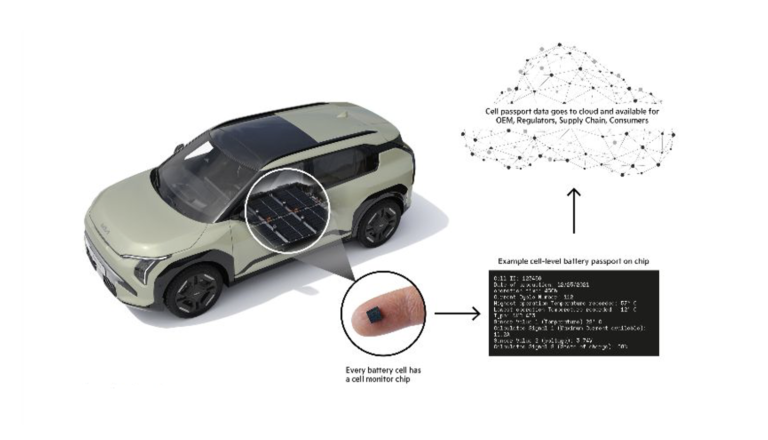A battery passport enables live state of health (SoH) tracking, real-time repair diagnostics and end-to-end traceability across the battery’s lifecycle, which helps extend battery life, make maintenance more affordable and build a higher level of trust when buying or selling used EVs.
“Kia aims to set a new standard for customers regarding battery transparency and performance,” said Marc Hedrich, president and CEO at Kia Europe. “Through testing cell-level battery passports, we gain insights on what ownership benefits we can offer our customers. On top of advantages such as extended battery life, we will be building on a relationship of trust as well.”
Separate from this preliminary research, Kia has established a dedicated internal organization, bringing together experts to develop its own battery passport service in collaboration with partners across the EV battery value chain and related networks.
The Kia battery passport is designed to go beyond regulatory requirements by including additional safety-related data. Kia plans to provide this service for all EV/HEV models sold in Europe by February 2027, as required by EU battery regulation.
Trial with a real model
For the trial, a Kia EV3 equipped with a Dukosi battery cell monitoring system was shipped from Korea to Europe, arriving in Germany in February. The trial vehicle was capable of monitoring and transmitting live data for each cell of the battery pack and uploading it to its digital battery passport. Once the data was uploaded, users, mechanics and regulators, among others, were able to access real-time information on the battery’s SoH through the car’s infotainment system. To access the battery passport data collected during the trial, a data-sharing pilot environment, developed by TNO, was used.
Enhanced battery monitoring precision enables targeted, cell-level repairs – replacing individual cells rather than entire modules, saving time and cost. For used EV owners, live battery data builds trust in performance, boosting resale value. This transparency also guides reuse and recycling decisions, extending battery life and reducing waste.
Delft University of Technology, together with Hyundai Motor Group, coordinated the collaborative passport trial.
Multi-partner European research trial
Behind the battery passport trials is an EU-wide, collaborative research initiative aiming to pilot and learn about the challenges and opportunities of implementing the EU battery passport in a real-life multi-stakeholder context.
In collaboration with the EU-funded DATAPIPE project, as well as ARN (Auto Recycling Nederland – a Dutch organization that collects and recycles end-of-life car batteries), the trial explored how digital product passports could potentially be beneficial in the future. Currently, the EU battery passport comprises more than 100 data attributes.
In related news, Ampere laboratory built to anticipate EV breakthroughs


